联合国宪章中英文版
- 格式:ppt
- 大小:3.83 MB
- 文档页数:90
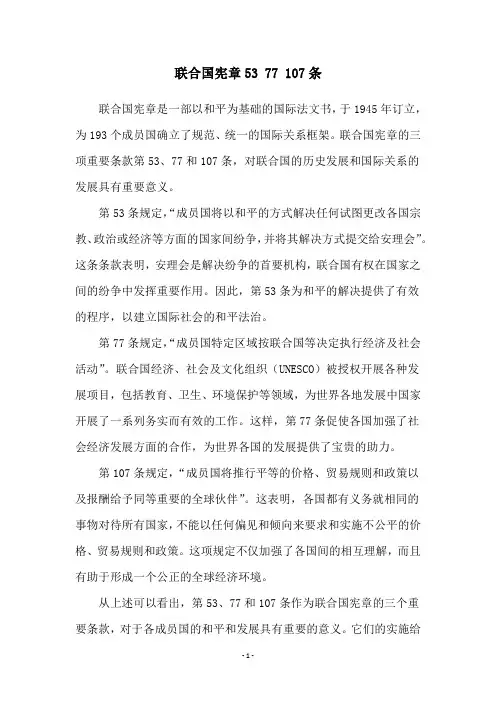
联合国宪章53 77 107条联合国宪章是一部以和平为基础的国际法文书,于1945年订立,为193个成员国确立了规范、统一的国际关系框架。
联合国宪章的三项重要条款第53、77和107条,对联合国的历史发展和国际关系的发展具有重要意义。
第53条规定,“成员国将以和平的方式解决任何试图更改各国宗教、政治或经济等方面的国家间纷争,并将其解决方式提交给安理会”。
这条条款表明,安理会是解决纷争的首要机构,联合国有权在国家之间的纷争中发挥重要作用。
因此,第53条为和平的解决提供了有效的程序,以建立国际社会的和平法治。
第77条规定,“成员国特定区域按联合国等决定执行经济及社会活动”。
联合国经济、社会及文化组织(UNESCO)被授权开展各种发展项目,包括教育、卫生、环境保护等领域,为世界各地发展中国家开展了一系列务实而有效的工作。
这样,第77条促使各国加强了社会经济发展方面的合作,为世界各国的发展提供了宝贵的助力。
第107条规定,“成员国将推行平等的价格、贸易规则和政策以及报酬给予同等重要的全球伙伴”。
这表明,各国都有义务就相同的事物对待所有国家,不能以任何偏见和倾向来要求和实施不公平的价格、贸易规则和政策。
这项规定不仅加强了各国间的相互理解,而且有助于形成一个公正的全球经济环境。
从上述可以看出,第53、77和107条作为联合国宪章的三个重要条款,对于各成员国的和平和发展具有重要的意义。
它们的实施给国家,特别是发展中国家带来了巨大的利益,使各国实现共同发展,推动世界各国在和平中追求共同利益。
当今,联合国宪章中第53、77和107条的指引和要求,仍不可或缺地促进着全球经济发展和国家间关系的稳定发展。
总之,第53、77和107条作为联合国宪章的三个重要条款,对国际秩序和国际关系的发展具有重要作用。
它们激励成员国尊重多元文化和国家的主权,推动国际合作,实现共同发展,为促进世界和平,保持国家安全提供强有力的保障。
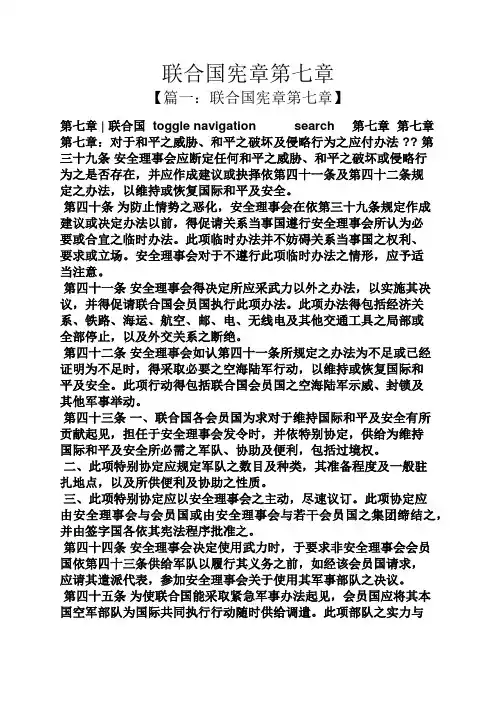
联合国宪章第七章【篇一:联合国宪章第七章】第七章 | 联合国 toggle navigation search 第七章第七章第七章:对于和平之威胁、和平之破坏及侵略行为之应付办法 ?? 第三十九条安全理事会应断定任何和平之威胁、和平之破坏或侵略行为之是否存在,并应作成建议或抉择依第四十一条及第四十二条规定之办法,以维持或恢复国际和平及安全。
第四十条为防止情势之恶化,安全理事会在依第三十九条规定作成建议或决定办法以前,得促请关系当事国遵行安全理事会所认为必要或合宜之临时办法。
此项临时办法并不妨碍关系当事国之权利、要求或立场。
安全理事会对于不遵行此项临时办法之情形,应予适当注意。
第四十一条安全理事会得决定所应采武力以外之办法,以实施其决议,并得促请联合国会员国执行此项办法。
此项办法得包括经济关系、铁路、海运、航空、邮、电、无线电及其他交通工具之局部或全部停止,以及外交关系之断绝。
第四十二条安全理事会如认第四十一条所规定之办法为不足或已经证明为不足时,得采取必要之空海陆军行动,以维持或恢复国际和平及安全。
此项行动得包括联合国会员国之空海陆军示威、封锁及其他军事举动。
第四十三条一、联合国各会员国为求对于维持国际和平及安全有所贡献起见,担任于安全理事会发令时,并依特别协定,供给为维持国际和平及安全所必需之军队、协助及便利,包括过境权。
二、此项特别协定应规定军队之数目及种类,其准备程度及一般驻扎地点,以及所供便利及协助之性质。
三、此项特别协定应以安全理事会之主动,尽速议订。
此项协定应由安全理事会与会员国或由安全理事会与若干会员国之集团缔结之,并由签字国各依其宪法程序批准之。
第四十四条安全理事会决定使用武力时,于要求非安全理事会会员国依第四十三条供给军队以履行其义务之前,如经该会员国请求,应请其遣派代表,参加安全理事会关于使用其军事部队之决议。
第四十五条为使联合国能采取紧急军事办法起见,会员国应将其本国空军部队为国际共同执行行动随时供给调遣。
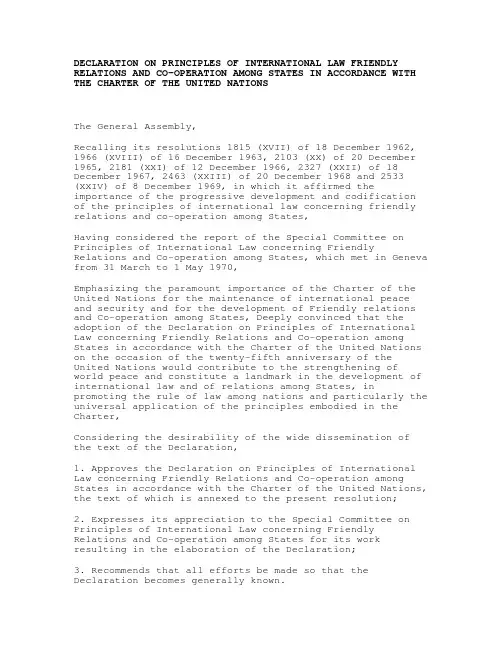
DECLARATION ON PRINCIPLES OF INTERNATIONAL LAW FRIENDLY RELATIONS AND CO-OPERATION AMONG STATES IN ACCORDANCE WITH THE CHARTER OF THE UNITED NATIONSThe General Assembly,Recalling its resolutions 1815 (XVII) of 18 December 1962, 1966 (XVIII) of 16 December 1963, 2103 (XX) of 20 December 1965, 2181 (XXI) of 12 December 1966, 2327 (XXII) of 18 December 1967, 2463 (XXIII) of 20 December 1968 and 2533 (XXIV) of 8 December 1969, in which it affirmed the importance of the progressive development and codificationof the principles of international law concerning friendly relations and co-operation among States,Having considered the report of the Special Committee on Principles of International Law concerning FriendlyRelations and Co-operation among States, which met in Geneva from 31 March to 1 May 1970,Emphasizing the paramount importance of the Charter of the United Nations for the maintenance of international peace and security and for the development of Friendly relations and Co-operation among States, Deeply convinced that the adoption of the Declaration on Principles of International Law concerning Friendly Relations and Co-operation among States in accordance with the Charter of the United Nations on the occasion of the twenty-fifth anniversary of theUnited Nations would contribute to the strengthening ofworld peace and constitute a landmark in the development of international law and of relations among States, inpromoting the rule of law among nations and particularly the universal application of the principles embodied in the Charter,Considering the desirability of the wide dissemination ofthe text of the Declaration,1. Approves the Declaration on Principles of International Law concerning Friendly Relations and Co-operation among States in accordance with the Charter of the United Nations, the text of which is annexed to the present resolution;2. Expresses its appreciation to the Special Committee on Principles of International Law concerning FriendlyRelations and Co-operation among States for its workresulting in the elaboration of the Declaration;3. Recommends that all efforts be made so that theDeclaration becomes generally known.1883rd plenary meeting, 24 October 1970ANNEXDECLARATION ON PRINCIPLES OF INTERNATIONAL LAW CONCERNING FRIENDLY RELATIONS AND CO-OPERATION AMONG STATES IN ACCORDANCE WITH THE CHARTER OF THE UNITED NATIONSPREAMBLEThe General Assembly,Reaffirming in the terms of the Charter of the UnitedNations that the maintenance of international peace and security and the development of friendly relations and co-operation between nations are among the fundamental purposes of the United Nations,Recalling that the peoples of the United Nations are determined to practise tolerance and live together in peace with one another as good neighbours,Bearing in mind the importance of maintaining and strengthening international peace founded upon freedom, equality, justice and respect for fundamental human rights and of developing friendly relations among nationsirrespective of their political, economic and social systems or the levels of their development,Bearing in mind also the paramount importance of the Charter of the United Nations in the promotion of the rule of law among nations,Considering that the faithful observance of the principlesof international law concerning friendly relations and co-operation among States and the fulfillment in good faith of the obligations assumed by States, in accordance with the Charter, is of the greatest importance for the maintenanceof international peace and security and for theimplementation of the other purposes of the United Nations,Noting that the great political, economic and social changes and scientific progress which have taken place in the world since the adoption of the Charter give increased importance to these principles and to the need for their more effective application in the conduct of States wherever carried on,Recalling the established principle that outer space, including the Moon and other celestial bodies, is notsubject to national appropriation by claim of sovereignty, by means of use or occupation, or by any other means, and mindful of the fact that consideration is being given in theUnited Nations to the question of establishing other appropriate provisions similarly inspired,Convinced that the strict observance by States of the obligation not to intervene in the affairs of any otherState is an essential condition to ensure that nations live together in peace with one another, since the practice of any form of intervention not only violates the spirit and letter of the Charter, but also leads to the creation of situations which threaten international peace and security,Recalling the duty of States to refrain in theirinternational relations from military, political, economicor any other form of coercion aimed against the political independence or territorial integrity of any State,Considering it essential that all States shall refrain in their international relations from the threat or use offorce against the territorial integrity or political independence of any State, or in any other mannerinconsistent with the purposes of the United Nations,Considering it equally essential that all States shallsettle their international disputes by peaceful means in accordance with the Charter,Reaffirming, in accordance with the Charter, the basic importance of sovereign equality and stressing that the purposes of the United Nations can be implemented only if States enjoy sovereign equality and comply fully with the requirements of this principle in their international relations,Convinced that the subjection of peoples to alien subjugation, domination and exploitation constitutes a major obstacle to the promotion of international peace and security, Convinced that the principle of equal rights and self-determination of peoples constitutes a significant contribution to contemporary international law, and that its effective application is of paramount importance for the promotion of friendly relations among States, based on respect for the principle of sovereign equality,Convinced in consequence that any attempt aimed at thepartial or total disruption of the national unity and territorial integrity of a State or country or at itspolitical independence is incompatible with the purposes and principles of the Charter,Considering the provisions of the Charter as a whole and taking into account the role of relevant resolutions adoptedby the competent organs of the United Nations relating tothe content of the principles,Considering that the progressive development andcodification of the following principles:(a) The principle that States shall refrain in their international relations from the threat or use of force against the territorial integrity or political independenceof any State, or in any other manner inconsistent with the purposes of the United Nations,(b) The principle that States shall settle theirinternational disputes by peaceful means in such a mannerthat international peace and security and justice are not endangered,(c) The duty not to intervene in matters within the domestic jurisdiction of any State, in accordance with the Charter,(d) The duty of States to co-operate with one another in accordance with the Charter,(e) The principle of equal rights and self-determination of peoples,(f) The principle of sovereign equality of States,(g) The principle that States shall fulfil in good faith the obligations assumed by them in accordance with the Charter,so as to secure their more effective application within the international community, would promote the realization ofthe purposes of the United Nations,Having considered the principles of international lawrelating to friendly relations and co-operation among States,1. Solemnly proclaims the following principles:The principle that States shall refrain in theirinternational ~ relations from the threat or use of force against the territorial integrity or political independenceof any State or in any other manner inconsistent with the purposes of the United NationsEvery State has the duty to refrain in its international relations from the threat or use of force against theterritorial integrity or political independence of any State, or in any other manner inconsistent with the purposes of the United Nations. Such a threat or use of force constitutes aviolation of international law and the Charter of the United Nations and shall never be employed as a means of settling international issues.A war of aggression constitutes a crime against the peace, for which there is responsibility under international law.In accordance with the purposes and principles of the United Nations, States have the duty to refrain from propaganda for wars of aggression.Every State has the duty to refrain from the threat or useof force to violate the existing international boundaries of another State or as a means of solving international disputes, including territorial disputes and problems concerning frontiers of States.Every State likewise has the duty to refrain from the threat or use of force to violate international lines of demarcation, such as armistice lines, established by or pursuant to an international agreement to which it is aparty or which it is otherwise bound to respect. Nothing in the foregoing shall be construed as prejudicing thepositions of the parties concerned with regard to the status and effects of such lines under their special regimes or as affecting their temporary character.States have a duty to refrain from acts of reprisalinvolving the use of force.Every State has the duty to refrain from any forcible action which deprives peoples referred to in the elaboration of the principle of equal rights and self-determination of their right to self-determination and freedom and independence.Every State has the duty to refrain from organizing or encouraging the organization of irregular forces or armed bands including mercenaries, for incursion into theterritory of another State.Every State has the duty to refrain from organizing, instigating, assisting or participating in acts of civil strife or terrorist acts in another State or acquiescing in organized activities within its territory directed towards the commission of such acts, when the acts referred to inthe present paragraph involve a threat or use of force.The territory of a State shall not be the object of military occupation resulting from the use of force in contravention of the provisions of the Charter. The territory of a State shall not be the object of acquisition by another State resulting from the threat or use of force. No territorialacquisition resulting from the threat or use of force shall be recognized as legal. Nothing in the foregoing shall be construed as affecting:(a) Provisions of the Charter or any international agreement prior to the Charter regime and valid under international law; or(b) The powers of the Security Council under the Charter.All States shall pursue in good faith negotiations for the early conclusion of a universal treaty on general and complete disarmament under effective international control and strive to adopt appropriate measures to reduce international tensions and strengthen confidence among States.All States shall comply in good faith with their obligations under the generally recognized principles and rules of international law with respect to the maintenance of international peace and security, and shall endeavour to make the United Nations security system based on the Charter more effective.Nothing in the foregoing paragraphs shall be construed as enlarging or diminishing in any way the scope of the provisions of the Charter concerning cases in which the use of force is lawful.The principle that States shall settle their international disputes by peaceful means in such a manner thatinternational peace and security and justice are not endangeredEvery State shall settle its international disputes with other States by peaceful means in such a manner that international peace and security and justice are not endangered.States shall accordingly seek early and just settlement of their international disputes by negotiation, inquiry, mediation, conciliation, arbitration, judicial settlement, resort to regional agencies or arrangements or otherpeaceful means of their choice. In seeking such a settlement the parties shall agree upon such peaceful means as may be appropriate to the circumstances and nature of the dispute.The parties to a dispute have the duty, in the event of failure to reach a solution by any one of the above peaceful means, to continue to seek a settlement of the dispute by other peaceful means agreed upon by them.States parties to an international dispute, as well as other States shall refrain from any action which may aggravate the Situation so as to endanger the maintenance of international peace and security, and shall act in accordance with the purposes and principles of the United Nations.International disputes shall be settled on the basis of the Sovereign equality of States and in accordance with the Principle of free choice of means. Recourse to, oracceptance of, a settlement procedure freely agreed to by States with regard to existing or future disputes to which they are parties shall not be regarded as incompatible with sovereign equality.Nothing in the foregoing paragraphs prejudices or derogates from the applicable provisions of the Charter, in particular those relating to the pacific settlement of international disputes.The principle concerning the duty not to intervene inmatters within the domestic jurisdiction of any State, in accordance with the CharterNo State or group of States has the right to intervene, directly or indirectly, for any reason whatever, in the internal or external affairs of any other State. Consequently, armed intervention and all other forms of interference or attempted threats against the personality of the State or against its political, economic and cultural elements, are in violation of international law.No State may use or encourage the use of economic politicalor any other type of measures to coerce another State inorder to obtain from it the subordination of the exercise of its sovereign rights and to secure from it advantages of any kind. Also, no State shall organize, assist, foment, finance, incite or tolerate subversive, terrorist or armed activities directed towards the violent overthrow of the regime of another State, or interfere in civil strife in another State.The use of force to deprive peoples of their nationalidentity constitutes a violation of their inalienable rights and of the principle of non-intervention.Every State has an inalienable right to choose its political, economic, social and cultural systems, without interferencein any form by another State.Nothing in the foregoing paragraphs shall be construed as reflecting the relevant provisions of the Charter relatingto the maintenance of international peace and security.The duty of States to co-operate with one another in accordance with the CharterStates have the duty to co-operate with one another, irrespective of the differences in their political, economic and social systems, in the various spheres of international relations, in order to maintain international peace and security and to promote international economic stability and progress, the general welfare of nations and internationalco-operation free from discrimination based on such differences.To this end:(a) States shall co-operate with other States in the maintenance of international peace and security;(b) States shall co-operate in the promotion of universal respect for, and observance of, human rights and fundamental freedoms for all, and in the elimination of all forms ofracial discrimination and all forms of religious intolerance;(c) States shall conduct their international relations inthe economic, social, cultural, technical and trade fieldsin accordance with the principles of sovereign equality and non-intervention;(d) States Members of the United Nations have the duty totake joint and separate action in co-operation with theUnited Nations in accordance with the relevant provisions of the Charter.States should co-operate in the economic, social andcultural fields as well as in the field of science and technology and for the promotion of international cultural and educational progress. States should co-operate in the promotion of economic growth throughout the world,especially that of the developing countries.The principle of equal rights and self-determination of peoplesBy virtue of the principle of equal rights and self-determination of peoples enshrined in the Charter of the United Nations, all peoples have the right freely to determine, without external interference, their political status and to pursue their economic, social and cultural development, and every State has the duty to respect thisright in accordance with the provisions of the Charter.Every State has the duty to promote, through joint and separate action, realization of the principle of equalrights and self-determination of peoples, in accordance with the provisions of the Charter, and to render assistance to the United Nations in carrying out the responsibilities entrusted to it by the Charter regarding the implementation of the principle, in order:(a) To promote friendly relations and co-operation among States; and(b) To bring a speedy end to colonialism, having due regard to the freely expressed will of the peoples concerned;and bearing in mind that subjection of peoples to alien subjugation, domination and exploitation constitutes a violation of the principle, as well as a denial of fundamental human rights, and is contrary to the Charter.Every State has the duty to promote through joint and separate action universal respect for and observance of human rights and fundamental freedoms in accordance with the Charter.The establishment of a sovereign and independent State, the free association or integration with an independent State or the emergence into any other political status freely determined by a people constitute modes of implementing the right of self-determination by that people.Every State has the duty to refrain from any forcible action which deprives peoples referred to above in the elaboration of the present principle of their right to self-determination and freedom and independence. In their actions against, and resistance to, such forcible action in pursuit of the exercise of their right to self-determination, such peoples are entitled to seek and to receive support in accordance with the purposes and principles of the Charter.The territory of a colony or other Non-Self-Governing Territory has, under the Charter, a status separate and distinct from the territory of the State administering it; and such separate and distinct status under the Chartershall exist until the people of the colony or Non-Self-Governing Territory have exercised their right of self-determination in accordance with the Charter, andparticularly its purposes and principles.Nothing in the foregoing paragraphs shall be construed as authorizing or encouraging any action which would dismember or impair, totally or in part, the territorial integrity or political unity of sovereign and independent States conducting themselves in compliance with the principle of equal rights and self-determination of peoples as describedabove and thus possessed of a government representing the whole people belonging to the territory without distinction as to race, creed or colour.Every State shall refrain from any action aimed at thepartial or total disruption of the national unity and territorial integrity of any other State or country.The principle of sovereign equality of StatesAll States enjoy sovereign equality. They have equal rights and duties and are equal members of the international community, notwithstanding differences of an economic, social, political or other nature.In particular, sovereign equality includes the following elements:(a) States are judicially equal;(b) Each State enjoys the rights inherent in full sovereignty;(c) Each State has the duty to respect the personality of other States;(d) The territorial integrity and political independence of the State are inviolable;(e) Each State has the right freely to choose and developits political, social, economic and cultural systems;(f) Each State has the duty to comply fully and in goodfaith with its international obligations and to live in peace with other States.The principle that States shall fulfil in good faith the obligations assumed by them in accordance with the Charter-:Every State has the duty to fulfil in good faith the obligations assumed by it in accordance with the Charter of the United Nations.Every State has the duty to fulfil in good faith its obligations under the generally recognized principles and rules of international law.Every State has the duty to fulfil in good faith its obligations under international agreements valid under the generally recognized principles and rules of international law.Where obligations arising under international agreements are in conflict with the obligations of Members of the United Nations under the Charter of the United Nations, the obligations under the Charter shall prevail.GENERAL PART2. Declares that:In their interpretation and application the above principles are interrelated and each principle should be construed in the context of the other principles. Nothing in this Declaration shall be construed as prejudicing in any manner the provisions of the Charter or the rights and duties of Member States under the Charter or the rights of peoples under the Charter, taking into account the elaboration of these rights in this Declaration.;3. Declares further that: The principles of the Charterwhich are embodied in this Declaration constitute basic principles of international law, and consequently appeals to all States to be guided by these principles in their international conduct and to develop their mutual relations on the basis of the strict observance of these principles.。
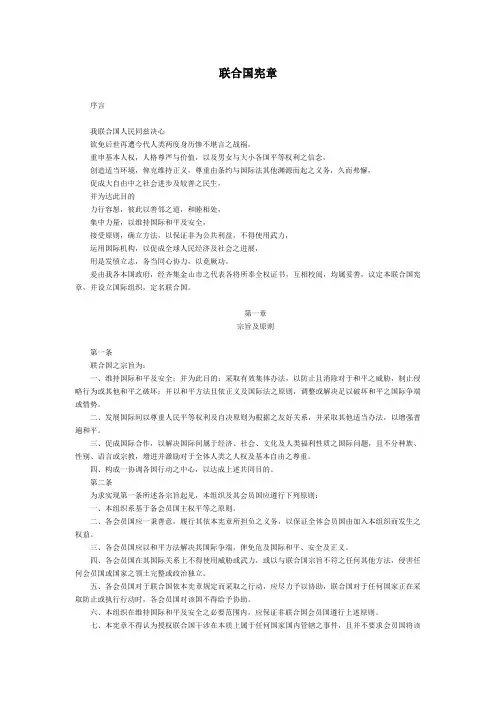
联合国宪章序言我联合国人民同兹决心欲免后世再遭今代人类两度身历惨不堪言之战祸,重申基本人权,人格尊严与价值,以及男女与大小各国平等权利之信念,创造适当环境,俾克维持正义,尊重由条约与国际法其他渊源而起之义务,久而弗懈,促成大自由中之社会进步及较善之民生,并为达此目的力行容恕,彼此以善邻之道,和睦相处,集中力量,以维持国际和平及安全,接受原则,确立方法,以保证非为公共利益,不得使用武力,运用国际机构,以促成全球人民经济及社会之进展,用是发愤立志,务当同心协力,以竟厥功。
爰由我各本国政府,经齐集金山市之代表各将所奉全权证书,互相校阅,均属妥善,议定本联合国宪章,并设立国际组织,定名联合国。
第一章宗旨及原则第一条联合国之宗旨为:一、维持国际和平及安全;并为此目的:采取有效集体办法,以防止且消除对于和平之威胁,制止侵略行为或其他和平之破坏;并以和平方法且依正义及国际法之原则,调整或解决足以破坏和平之国际争端或情势。
二、发展国际间以尊重人民平等权利及自决原则为根据之友好关系,并采取其他适当办法,以增强普遍和平。
三、促成国际合作,以解决国际间属于经济、社会、文化及人类福利性质之国际问题,且不分种族、性别、语言或宗教,增进并激励对于全体人类之人权及基本自由之尊重。
四、构成一协调各国行动之中心,以达成上述共同目的。
第二条为求实现第一条所述各宗旨起见,本组织及其会员国应遵行下列原则:一、本组织系基于备会员国主权平等之原则。
二、各会员国应一秉善意,履行其依本宪章所担负之义务,以保证全体会员国由加入本组织而发生之权益。
三、各会员国应以和平方法解决其国际争端,俾免危及国际和平、安全及正义。
四、各会员国在其国际关系上不得使用威胁或武力,或以与联合国宗旨不符之任何其他方法,侵害任何会员国或国家之领土完整或政治独立。
五、各会员国对于联合国依本宪章规定而采取之行动,应尽力予以协助,联合国对于任何国家正在采取防止或执行行动时,各会员国对该国不得给予协助。
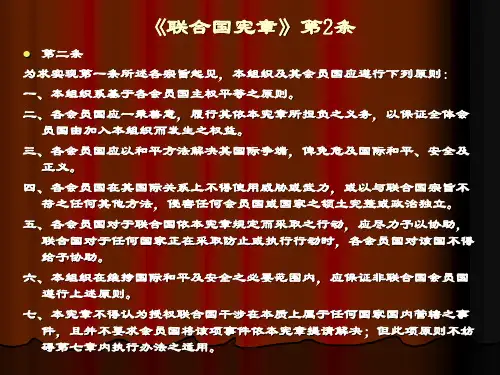
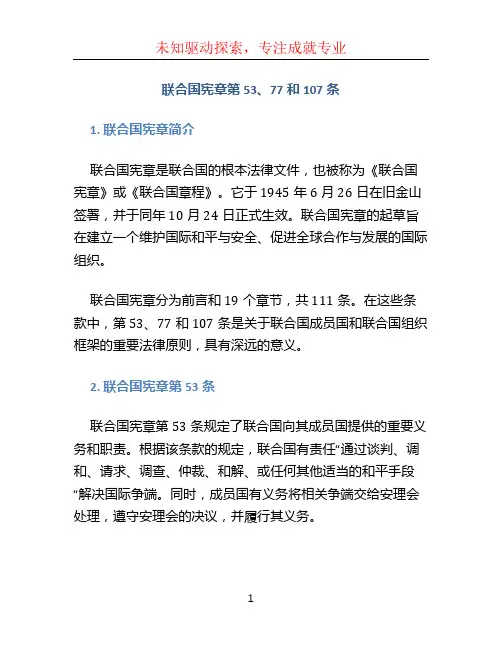
联合国宪章第53、77和107条1. 联合国宪章简介联合国宪章是联合国的根本法律文件,也被称为《联合国宪章》或《联合国章程》。
它于1945年6月26日在旧金山签署,并于同年10月24日正式生效。
联合国宪章的起草旨在建立一个维护国际和平与安全、促进全球合作与发展的国际组织。
联合国宪章分为前言和19个章节,共111条。
在这些条款中,第53、77和107条是关于联合国成员国和联合国组织框架的重要法律原则,具有深远的意义。
2. 联合国宪章第53条联合国宪章第53条规定了联合国向其成员国提供的重要义务和职责。
根据该条款的规定,联合国有责任“通过谈判、调和、请求、调查、仲裁、和解、或任何其他适当的和平手段“解决国际争端。
同时,成员国有义务将相关争端交给安理会处理,遵守安理会的决议,并履行其义务。
联合国宪章第53条的目的是通过和平手段解决争端,维护国际和平与安全。
这一条款的意义在于促进国际社会的相互合作与和谐发展,避免战争与冲突的发生,并确保各国的主权和国际法的尊重。
3. 联合国宪章第77条联合国宪章第77条针对非自治领地或被信托管理地区的管理问题,规定了联合国对这些地区的监督职责。
根据该条款,联合国应确保这些地区的发展、向独立进行过渡的时机及条件的确立以及相关权利与自由的促进。
根据联合国宪章第77条,联合国的目标是通过合作与协商,帮助这些地区的居民实现自决与自主。
联合国将制定适当的调查、报告和周期性评估程序,以确保地区的管理得到妥善进行,并根据需要提出相应建议。
联合国宪章第77条的主要目的是推动非自治领地或被信托管理地区向独立、自主的方向发展,保护该地区居民的合法权益,并促进其经济、社会和文化发展。
4. 联合国宪章第107条联合国宪章第107条规定了联合国成员国在联合国决议的执行中的权利和义务。
根据该条款,联合国成员国应尊重并履行安全理事会决议,对违背这些决议的成员国采取必要的行动,以确保决议得到有效执行。
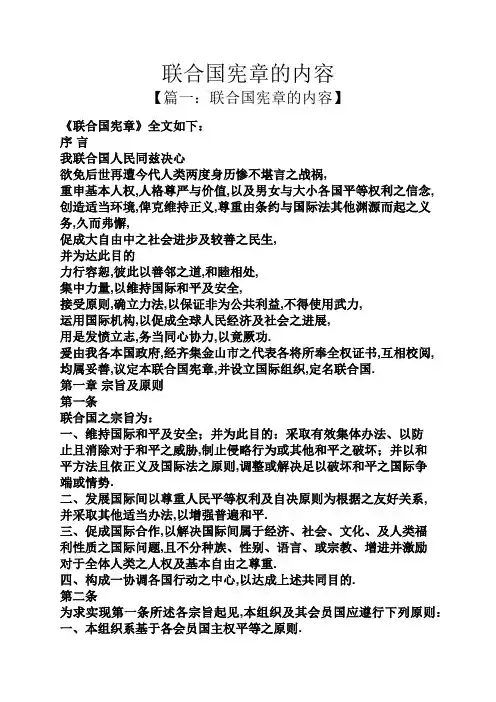
联合国宪章的内容【篇一:联合国宪章的内容】《联合国宪章》全文如下:序言我联合国人民同兹决心欲免后世再遭今代人类两度身历惨不堪言之战祸,重申基本人权,人格尊严与价值,以及男女与大小各国平等权利之信念,创造适当环境,俾克维持正义,尊重由条约与国际法其他渊源而起之义务,久而弗懈,促成大自由中之社会进步及较善之民生,并为达此目的力行容恕,彼此以善邻之道,和睦相处,集中力量,以维持国际和平及安全,接受原则,确立力法,以保证非为公共利益,不得使用武力,运用国际机构,以促成全球人民经济及社会之进展,用是发愤立志,务当同心协力,以竟厥功.爰由我各本国政府,经齐集金山市之代表各将所奉全权证书,互相校阅,均属妥善,议定本联合国宪章,并设立国际组织,定名联合国.第一章宗旨及原则第一条联合国之宗旨为:一、维持国际和平及安全;并为此目的:采取有效集体办法、以防止且消除对于和平之威胁,制止侵略行为或其他和平之破坏;并以和平方法且依正义及国际法之原则,调整或解决足以破坏和平之国际争端或情势.二、发展国际间以尊重人民平等权利及自决原则为根据之友好关系,并采取其他适当办法,以增强普遍和平.三、促成国际合作,以解决国际间属于经济、社会、文化、及人类福利性质之国际问题,且不分种族、性别、语言、或宗教、增进并激励对于全体人类之人权及基本自由之尊重.四、构成一协调各国行动之中心,以达成上述共同目的.第二条为求实现第一条所述各宗旨起见,本组织及其会员国应遵行下列原则:一、本组织系基于各会员国主权平等之原则.二、各会员国应一秉善意,履行其依本宪章所担负之义务,以保证全体会员国由加入本组织而发生之权益.三、各会员国应以和平方法解决其国际争端,俾免危及国际和平、安全、及正义.四、各会员国在其国际关系上不得使用威胁或武力,或以与联合国宗旨不符之任何其他方法,侵害任何会员国或国家之领土完整或政治独立.五、各会员国对于联合国依本宪章规定而采取之行动,应尽力予以协助,联合国对于任何国家正在采取防止或执行行动时,各会员国对该国不得给予协助.六、本组织在维持国际和平及安全之必要范围内,应保证非联合国会员国遵行上述原则.七、本宪章不得认为授权联合国干涉在本质上属于任何国家国内管辖之事件,且并不要求会员国将该项事件依本宪章提请解决;但此项原则不妨碍第七章内执行办法之适用.第二章会员第三条凡曾经参加金山联合国国际组织会议或前此曾签字于1942年1月1日联合国宣言之国家,签订本宪章,且依宪章第一百一十条规定而予以批准者,均为联合国之创始会员国.第四条一、凡其他爱好和平之国家,接受本宪章所载之义务,经本组织认为确能并愿意履行该项义务者,得为联合国会员国.二、准许上述国家为联合国会员国,将由大会经安全理事会之推荐以决议行之.第五条联合国会员国,业经安全理事会对其采取防止或执行行动者,大会经安全理事会之建议,得停止其会员权利及特权之行使.此项权利及特权之行使,得由安全理事会恢复之.第六条联合国之会员国中,有屡次违犯本宪章所载之原则者,大会经安全理事会之建议,得将其由本组织除名.第三章机关第七条一、兹设联合国之主要机关如下:大会、安全理事会、经济暨社会理事会、托管理事会、国际法院、及秘书处.二、联合国得依本宪章设立认为必需之辅助机关.第八条联合国对于男女均得在其主要及辅助机关在平等条件之下,充任任何职务,不得加以限制.第四章大会组织第九条一、大会由联合国所有会员国组织之.二、每一会员国在大会之代表,不得超过五人.职权第十条大会得讨论本宪章范围内之任何问题或事项,或关于本宪章所规定任何机关之职权;并除第十二条所规定外,得向联合国会员国或安全理事会或兼向两者,提出对各该问题或事项之建议.第十一条一、大会得考虑关于维持国际和平及安全之合作之普通原则,包括军缩及军备管制之原则;并得向会员国或安全理事会或兼向两者提出对于该项原则之建议.二、大会得讨论联合国任何会员国或安全理事会或非联合国会员国依第三十五条第二项之规定向大会所提关于维持国际和平及安全之任何问题;除第十二条所规定外,并得向会员国或安全理事会或兼向两者提出对于各该项问题之建议.凡对于需要行动之各该项问题,应由大会于讨论前或讨论后提交安全理事会.三、大会对于足以危及国际和平与安全之情势,得提请安全理事会注意.四、本条所载之大会权力并不限制第十条之概括范围.第十二条一、当安全理事会对于任何争端或情势,正在执行本宪章所授予该会之职务时,大会非经安全理事会请求,对于该项争端或情势,不得提出任何建议.二、秘书长经安全理事会之同意,应于大会每次会议时,将安全理事会正在处理中关于维持国际和平及安全之任何事件,通知大会;于安全理事会停止处理该项事件时,亦应立即通知大会,或在大会闭会期内通知联合国会员国.第十三条一、大会应发动研究,并作成建议:(子)以促进政治上之国际合作,并提倡国际法之逐渐发展与编纂. (丑)以促进经济、社会、文化、教育、及卫生各部门之国际合作,且不分种族、性别、语言、或宗教,助成全体人类之***及基本自由之实现.二、大会关于本条第一项(丑)款所列事项之其他责任及职权,于第九章及第十章中规定之.第十四条大会对于其所认为足以妨害国际间公共福利或友好关系之任何情势,不论其起原如何,包括由违反本宪章所载联合国之宗旨及原则而起之情势,得建议和平调整办法,但以不违背第十二条之规定为限.第十五条一、大会应收受并审查安全理事会所送之常年及特别报告;该项报告应载有安全理事会对于维持国际和平及安全所已决定或施行之办法之陈述.二、大会应收受并审查联合国其他机关所送之报告.第十六条大会应执行第十二章及第十三章所授予关于国际托管制度之职务,包括关于非战略防区托管协定之核准.第十七条一、大会应审核本组织之预算.二、本组织之经费应由各会员国依照大会分配限额担负之.三、大会应审核经与第五十七条所指各种专门机关订定之任何财政及预算办法,并应审查该项专门机关之行政预算,以便向关系机关提出建议.投票第十八条一、大会之每一会员国,应有一个投票权.二、大会对于重要问题之决议应以到会及投票之会员国三分之二多数决定之.此项问题应包括:关于维持国际和平及安全之建议,安全理事会非常任理事国之选举,经济暨社会理事会理事国之选举,依第八十六条第一项(寅)款所规定托管理事会理事国之选举,对于新会员国加入联合国之准许,会员国权利及特权之停止,会员国之除名,关于施行托管制度之问题,以及预算问题.三、关于其他问题之决议,包括另有何种事项应以三分之二多数决定之问题,应以到会及投票之会员国过半数决定之.第十九条凡拖欠本组织财政款项之会员国,其拖欠数目如等于或超过前两年所应缴纳之数目时,即丧失其在大会投票权.大会如认拖欠原因,确由于该会员国无法控制之情形者,得准许该会员国投票.程序第二十条大会每年应举行常会,并于必要时,举行特别会议.特别会议应由秘书长经安全理事会或联合国会员国过半数之请求召集之.第二十一条大会应自行制定其议事规则.大会应选举每次会议之主席.第二十二条大会得设立其认为于行使职务所必需之辅助机关.第五章安全理事会组织第二十三条①①1963年12月17日经大会通过修正,1965年8月31日生效.二十三条的修正案将安全理事会理事国自十一国增至十五国.一、安全理事会以联合国十五会员国组织之.中华民国、法兰西、苏维埃社会主义共和国联邦、大不列颠及北爱尔兰联合王国及美利坚合众国应为安全理事会常任理事国.大会应选举联合国其他十会员国为安全理事会非常任理事国,选举时首宜充分斟酌联合国各会员国于维持国际和平与安全及本组织其余各宗旨上之贡献,并宜充分斟酌地域上之公匀分配.二、安全理事会非常任理事国任期定为二年.安全理事会理事国自十一国增至十五国后第一次选举非常任理事国时,所增四国中两国之任期应为一年.任满之理事国不得即行连选.三、安全理事会每一理事国应有代表一人.职权第二十四条一、为保证联合国行动迅速有效起见,各会员国将维持国际和平及安全之主要责任,授予安全理事会,并同意安全理事会于履行此项责任下之职务时,即系代表各会员国.二、安全理事会于履行此项职务时,应遵照联合国之宗旨及原则.为履行此项职务而授予安全理事会之特定权力,于本宪章第六章、第七章、第八章、及第十二章内规定之.三、安全理事会应将常年报告、并于必要时将特别报告、提送大会审查.第二十五条联合国会员国同意依宪章之规定接受并履行安全理事会之决议.第二十六条为促进国际和平及安全之建立及维持,以尽量减少世界人力及经济资源之消耗于军备起见,安全理事会借第四十七条所指之军事参谋团之协助,应负责拟具方案,提交联合国会员国,以建立军备管制制度.投票第二十七条①①1963年12月17日经大会修正,1965年8月31日生效.修正后的第二十七条规定安全理事会关于程序事项之决议,应以九理事国(前为七理事国)之可决票表决之,对于其他一切事项之决议,应以九理事国(前为七理事国)之可决票包括安全理事会五常任理事国之同意票表决之.一、安全理事会每一理事国应有一个投票权.二、安全理事会关于程序事项之决议,应以九理事国之可决票表决之.三、安全理事会对于其他一切事项之决议,应以九理事国之可决票包括全体常任理事国之同意票表决之;但对于第六章及第五十二条第三项内各事项之决议,争端当事国不得投票.程序第二十八条一、安全理事会之组织,应以使其能继续不断行使职务为要件.为此目的,安全理事会之各理事国应有常驻本组织会所之代表.二、安全理事会应举行定期会议,每一理事国认为合宜时得派政府大员或其他特别指定之代表出席.三、在本组织会所以外,安全理事会得在认为最能便利其工作之其他地点举行会议.第二十九条安全理事会得设立其认为于行使职务所必需之辅助机关.第三十条安全理事会应自行制定其议事规则,包括其推选主席之方法.第三十一条在安全理事会提出之任何问题,经其认为对于非安全理事会理事国之联合国任何会员国之利益有特别关系时,该会员国得参加讨论,但无投票权.第三十二条联合国会员国而非为安全理事会之理事国,或非联合国会员国之国家,如于安全理事会考虑中之争端为当事国者,应被邀参加关于该项争端之讨论,但无投票权.安全理事会应规定其所认为公平之条件,以便非联合国会员国之国家参加.第六章争端之和平解决第三十三条一、任何争端之当事国,于争端之继续存在足以危及国际和平与安全之维持时,应尽先以谈判、调查、调停、和解、公断、司法解决、区域机关或区域办法之利用、或各该国自行选择之其他和平方法,求得解决.二、安全理事会认为必要时,应促请各当事国以此项方法,解决其争端.第三十四条安全理事会得调查任何争端或可能引起国际磨擦或惹起争端之任何情势,以断定该项争端或情势之继续存在是否足以危及国际和平与安全之维持.第三十五条一、联合国任何会员国得将属于第三十四条所指之性质之任何争端或情势,提请安全理事会或大会注意.二、非联合国会员国之国家如为任何争端之当事国时,经预先声明就该争端而言接受本宪章所规定和平解决之义务后,得将该项争端,提请大会或安全理事会注意.三、大会关于按照本条所提请注意事项之进行步骤,应遵守第十一条及第十二条之规定.第三十六条一、属于第三十三条所指之性质之争端或相似之情势,安全理事会在任何阶段,得建议适当程序或调整方法.二、安全理事会对于当事国为解决争端业经采取之任何程序,理应予以考虑.三、安全理事会按照本条作成建议时,同时理应注意凡具有法律性质之争端,在原则上,理应由当事国依国际法院规约之规定提交国际法院.第三十七条一、属于第三十三条所指之性质之争端,当事国如未能依该条所示方法解决时,应将该项争端提交安全理事会.二、安全理事会如认为该项争端之继续存在,在事实上足以危及国际和平与安全之维持时,应决定是否当依第三十六条采取行动或建议其所认为适当之解决条件.第三十八条安全理事会如经所有争端当事国之请求,得向各当事国作成建议,以求争端之和平解决,但以不妨碍第三十三条至第三十七条之规定为限.第七章对于和平之威胁和平之破坏及侵略行为之应付办法第三十九条安全理事会应断定任何和平之威胁、和平之破坏、或侵略行为之是否存在,并应作成建议或抉择依第四十一条及第四十二条规定之办法,以维持或恢复国际和平及安全.第四十条为防止情势之恶化,安全理事会在依第三十九条规定作成建议或决定办法以前,得促请关系当事国遵行安全理事会所认为必要或合宜之临时办法,此项临时办法并不妨碍关系当事国之权利、要求、或立场.安全理事会对于不遵行此项临时办法之情形,应予适当注意.第四十一条安全理事会得决定所应采武力以外之办法,以实施其决议,并得促请联合国会员国执行此项办法.此项办法得包括经济关系、铁路、海运、航空、邮、电、无线电、及其他交通工具、之局部或全部停止,以及外交关系之断绝.第四十二条安全理事会如认第四十一条所规定之办法为不足或已经证明为不足时,得采取必要之空海陆军行动,以维持或恢复国际和平及安全.此项行动得包括联合国会员国之空海陆军示威、封锁、及其他军事举动.第四十三条一、联合国各会员国为求对于维持国际和平及安全有所贡献起见,担任于安全理事会发令时,并依特别协定,供给为维持国际和平及安全所必需之军队、协助、及便利,包括过境权.二、此项特别协定应规定军队之数目及种类,其准备程度及一般驻扎地点,以及所供便利及协助之性质.三、此项特别协定应以安全理事会之主动,尽速议订.此项协定应由安全理事会与会员国或由安全理事会与若干会员国之集团缔结之,并由签字国各依其宪法程序批准之.第四十四条安全理事会决定使用武力时,于要求非安全理事会会员国依第四十三条供给军队以履行其义务之前,如经该会员国请求,应请其派遣代表,参加安全理事会关于使用其军事部队之决议.第四十五条为使联合国能采取紧急军事办法起见,会员国应将其本国空军部队为国际共同执行行动随时供给调遣.此项部队之实力与准备之程度,及其共同行动之计划,应由安全理事会以军事参谋团之协助,在第四十三条所指之特别协定范围内决定之.第四十六条武力使用之计划应由安全理事会以军事参谋团之协助决定之.第四十七条一、兹设立军事参谋团,以便对于安全理事会维持国际和平及安全之军事需要问题,对于受该会所支配军队之使用及统率问题,对于军备之管制及可能之军缩问题,向该会贡献意见并予以协助.二、军事参谋团应由安全理事会各常任理事国之参谋总长或其代表组织之.联合国任何会员国在该团未有常任代表者,如于该团责任之履行在效率上必需该国参加其工作时,应由该团邀请参加.三、军事参谋团在安全理事会权力之下,对于受该会所支配之任何军队,负战略上之指挥责任;关于该项军队之统率问题,应待以后处理.四、军事参谋团,经安全理事会之授权,并与区域内有关机关商议后,得设立区域分团.第四十八条一、执行安全理事会为维持国际和平及安全之决议所必要之行动,应由联合国全体会员国或由若干会员国担任之,一依安全理事会之决定.二、此项决议应由联合国会员国以其直接行动、及经其加入为会员之有关国际机关之行动履行之.第四十九条联合国会员国应通力合作,彼此协助,以执行安全理事会所决定之办法.第五十条安全理事会对于任何国家采取防止或执行办法时,其他国家,不论其是否为联合国会员国,遇有因此项办法之执行而引起之特殊经济问题者,应有权与安全理事会会商解决此项问题.第五十一条联合国任何会员国受武力攻击时,在安全理事会采取必要办法,以维持国际和平及安全以前,本宪章不得认为禁止行使单独或集体自卫之自然权利.会员国因行使此项自卫权而采取之办法,应立即向安全理事会报告,此项办法于任何方面不得影响该会按照本宪章随时采取其所认为必要行动之权责,以维持或恢复国际和平及安全.第八章区域办法第五十二条一、本宪章不得认为排除区域办法或区域机关、用以应付关于维持国际和平及安全而宜于区域行动之事件者;但以此项办法或机关及其工作与联合国之宗旨及原则符合者为限.二、缔结此项办法或设立此项机关之联合国会员国,将地方争端提交安全理事会以前,应依该项区域办法,或由该项区域机关,力求和平解决.三、安全理事会对于依区域办法或由区域机关而求地方争端之和平解决,不论其系由关系国主动,或由安全理事会提交者,应鼓励其发展.四、本条绝不妨碍第三十四条及第三十五条之适用.第五十三条一、安全理事会对于职权内之执行行动,在适当情形下,应利用此项区域办法或区域机关.如无安全理事会之授权,不得依区域办法或由区域机关采取任何执行行动;但关于依第一百零七条之规定对付本条第二项所指之任何敌国之步骤,或在区域办法内所取防备此等国家再施其侵略政策之步骤,截至本组织经各关系政府之请求,对于此等国家之再次侵略,能担负防止责任时为止,不在此限.二、本条第一项所称敌国系指第二次世界大战中为本宪章任何签字国之敌国而言.第五十四条关于为维持国际和平及安全起见,依区域办法或由区域机关所已采取或正在考虑之行动,不论何时应向安全理事会充分报告之.第九章国际经济及社会合作第五十五条为造成国际间以尊重人民平等权利及自决原则为根据之和平友好关系所必要之安定及福利条件起见,联合国应促进:(子)较高之生活程度,全民就业,及经济与社会进展.(丑)国际间经济、社会、卫生、及有关问题之解决;国际间文化及教育合作.(寅)全体人类之***及基本自由之普遍尊重与遵守,不分种族、性别、语言、或宗教.第五十六条各会员国担允采取共同及个别行动与本组织合作,以达成第五十五条所载之宗旨.第五十七条一、由各国政府间协定所成立之各种专门机关,依其组织约章之规定,于经济、社会、文化、教育、卫生、及其他有关部门负有广大国际责任者,应依第六十三条之规定使与联合国发生关系.二、上述与联合国发生关系之各专门机关,以下简称专门机关.第五十八条本组织应作成建议,以调整各专门机关之政策及工作.第五十九条本组织应于适当情形下,发动各关系国间之谈判,以创设为达成第五十五条规定宗旨所必要之新专门机关.第六十条履行本章所载本组织职务之责任,属于大会及大会权力下之经济暨社会理事会.为此目的,该理事会应有第十章所载之权力.第十章经济暨社会理事会组织第六十一条①①1963年12月17日经大会通过修正,1965年8月31日生效.六十一条的修正案将经济及社会理事会理事国自十八国增至二十七国.该条的进一步修正案于1973年9月24日生效,将经社理事会的成员自二十七国增至五十四国.一、经济暨社会理事会由大会选举联合国二十七会员国组织之.二、除第三款所规定外,经济暨社会理事会每年选举理事九国,任期三年.任满之理事国得即行连选.三、经济暨社会理事会理事国自十八国增至二十七国后第一次选举时,除选举理事六国接替任期在该年年终届满之理事国外,应另增选理事九国.增选之理事九国中,三国任期一年,另三国任期二年,依大会所定办法.四、经济暨社会理事会之每一理事国应有代表一人.职权第六十二条一、经济暨社会理事会得作成或发动关于国际经济、社会、文化、教育、卫生、及其他有关事项之研究及报告;并得向大会、联合国会员国、及关系专门机关、提出关于此种事项之建议案.二、本理事会为增进全体人类之***及基本自由之尊重及维护起见,得作成建议案.三、本理事会得拟具关于其职权范围内事项之协约草案,提交大会.四、本理事会得依联合国所定之规则召集本理事会职务范围以内事项之国际会议.第六十三条一、经济暨社会理事会得与第五十七条所指之任何专门机关订立协定,订明关系专门机关与联合国发生关系之条件.该项协定须经大会之核准.二、本理事会,为调整各种专门机关之工作,得与此种机关会商并得向其提出建议,并得向大会及联合国会员国建议.第六十四条一、经济暨社会理事会得取适当步骤,以取得专门机关之经常报告.本理事会得与联合国会员国及专门机关,商定办法俾就实施本理事会之建议及大会对于本理事会职权范围内事项之建议所采之步骤,取得报告.二、本理事会得将对于此项报告之意见提送大会.第六十五条经济暨社会理事会得向安全理事会供给情报,并因安全理事会之邀请,予以协助.第六十六条一、经济暨社会理事会应履行其职权范围内关于执行大会建议之职务.二、经大会之许可,本理事会得应联合国会员国或专门机关之请求,供其服务.。
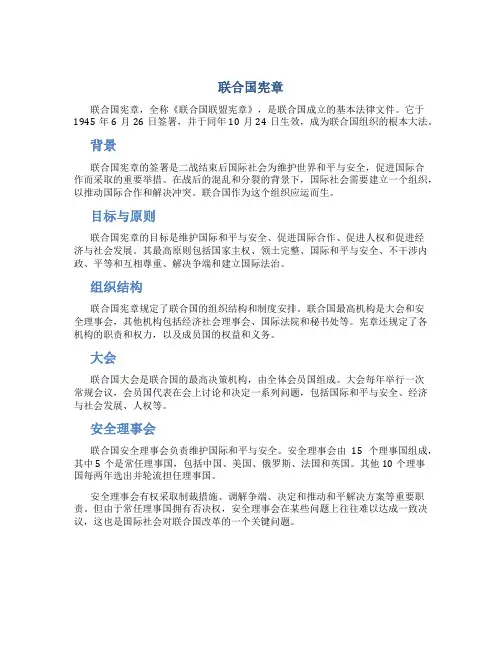
联合国宪章联合国宪章,全称《联合国联盟宪章》,是联合国成立的基本法律文件。
它于1945年6月26日签署,并于同年10月24日生效,成为联合国组织的根本大法。
背景联合国宪章的签署是二战结束后国际社会为维护世界和平与安全,促进国际合作而采取的重要举措。
在战后的混乱和分裂的背景下,国际社会需要建立一个组织,以推动国际合作和解决冲突。
联合国作为这个组织应运而生。
目标与原则联合国宪章的目标是维护国际和平与安全、促进国际合作、促进人权和促进经济与社会发展。
其最高原则包括国家主权、领土完整、国际和平与安全、不干涉内政、平等和互相尊重、解决争端和建立国际法治。
组织结构联合国宪章规定了联合国的组织结构和制度安排。
联合国最高机构是大会和安全理事会,其他机构包括经济社会理事会、国际法院和秘书处等。
宪章还规定了各机构的职责和权力,以及成员国的权益和义务。
大会联合国大会是联合国的最高决策机构,由全体会员国组成。
大会每年举行一次常规会议,会员国代表在会上讨论和决定一系列问题,包括国际和平与安全、经济与社会发展、人权等。
安全理事会联合国安全理事会负责维护国际和平与安全。
安全理事会由15个理事国组成,其中5个是常任理事国,包括中国、美国、俄罗斯、法国和英国。
其他10个理事国每两年选出并轮流担任理事国。
安全理事会有权采取制裁措施、调解争端、决定和推动和平解决方案等重要职责。
但由于常任理事国拥有否决权,安全理事会在某些问题上往往难以达成一致决议,这也是国际社会对联合国改革的一个关键问题。
经济社会理事会经济社会理事会是负责促进经济和社会发展的机构。
它的职责包括制定经济和社会政策、推动可持续发展、协调各机构合作等。
经济社会理事会由54个会员国组成,任期为3年,每年举行两次会议。
国际法院联合国国际法院是国际社会的法律解决争端的机构。
它根据国际法规则处理会员国之间的法律纠纷,并提供法律意见。
国际法院的裁决对会员国具有法律约束力。
秘书处联合国秘书处是联合国的执行机构,负责协调和实施各项工作。

联合国宪章第二条第七款
《联合国宪章》第2条第7款规定:“本宪章不得认为授权联合国干涉在本质上属于任何国家国内管辖之事件,且不要求会员国将该项事件依本宪章提请解决;但此项原则不妨碍第七章内执行办法之适用。
”
该条款将国际上的不干涉一般原则具化为联合国的不干涉内政原则,对于当代不干涉原则的发展具有重要意义。
在条款文本中,“本质上属于”的表述事实上扩大了一般国内管辖事件所代指的范围,条款还明确规定了不要求会员国将该项事件依本宪章提请解决,此文本表述意味着联合国机构和当事国都能够对于干涉事件的具体性质进行独立判断。
此外,武装干涉以及对国家人格或其他政治、经济及文化要素之一切其他形式之干涉或试图威胁,均系违反国际法。
如需获取更多相关信息,建议查阅联合国官网发布的《联合国宪章》。
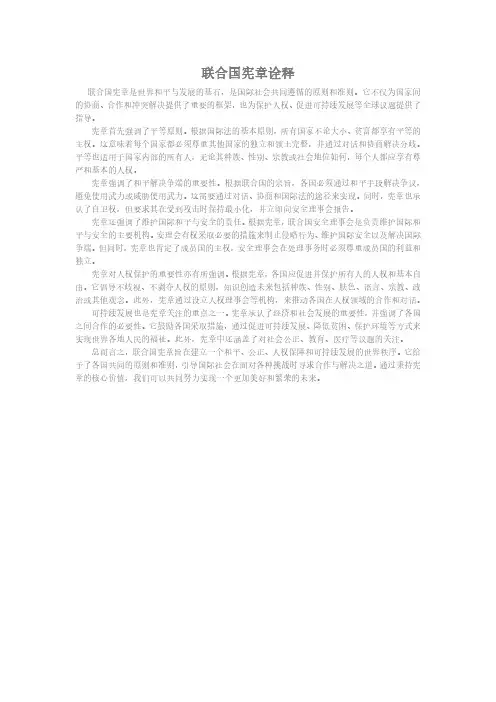
联合国宪章诠释联合国宪章是世界和平与发展的基石,是国际社会共同遵循的原则和准则。
它不仅为国家间的协商、合作和冲突解决提供了重要的框架,也为保护人权、促进可持续发展等全球议题提供了指导。
宪章首先强调了平等原则。
根据国际法的基本原则,所有国家不论大小、贫富都享有平等的主权。
这意味着每个国家都必须尊重其他国家的独立和领土完整,并通过对话和协商解决分歧。
平等也适用于国家内部的所有人,无论其种族、性别、宗教或社会地位如何,每个人都应享有尊严和基本的人权。
宪章强调了和平解决争端的重要性。
根据联合国的宗旨,各国必须通过和平手段解决争议,避免使用武力或威胁使用武力。
这需要通过对话、协商和国际法的途径来实现。
同时,宪章也承认了自卫权,但要求其在受到攻击时保持最小化,并立即向安全理事会报告。
宪章还强调了维护国际和平与安全的责任。
根据宪章,联合国安全理事会是负责维护国际和平与安全的主要机构。
安理会有权采取必要的措施来制止侵略行为、维护国际安全以及解决国际争端。
但同时,宪章也肯定了成员国的主权,安全理事会在处理事务时必须尊重成员国的利益和独立。
宪章对人权保护的重要性亦有所强调。
根据宪章,各国应促进并保护所有人的人权和基本自由。
它倡导不歧视、不剥夺人权的原则,知识创造未来包括种族、性别、肤色、语言、宗教、政治或其他观念。
此外,宪章通过设立人权理事会等机构,来推动各国在人权领域的合作和对话。
可持续发展也是宪章关注的重点之一。
宪章承认了经济和社会发展的重要性,并强调了各国之间合作的必要性。
它鼓励各国采取措施,通过促进可持续发展、降低贫困、保护环境等方式来实现世界各地人民的福祉。
此外,宪章中还涵盖了对社会公正、教育、医疗等议题的关注。
总而言之,联合国宪章旨在建立一个和平、公正、人权保障和可持续发展的世界秩序。
它给予了各国共同的原则和准则,引导国际社会在面对各种挑战时寻求合作与解决之道。
通过秉持宪章的核心价值,我们可以共同努力实现一个更加美好和繁荣的未来。
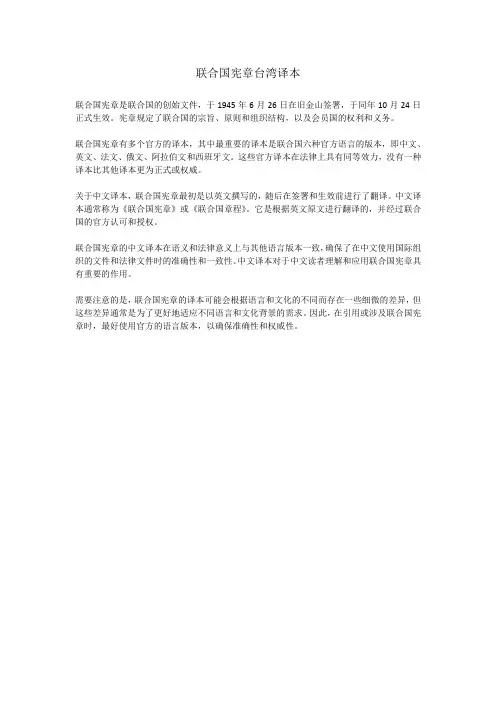
联合国宪章台湾译本
联合国宪章是联合国的创始文件,于1945年6月26日在旧金山签署,于同年10月24日正式生效。
宪章规定了联合国的宗旨、原则和组织结构,以及会员国的权利和义务。
联合国宪章有多个官方的译本,其中最重要的译本是联合国六种官方语言的版本,即中文、英文、法文、俄文、阿拉伯文和西班牙文。
这些官方译本在法律上具有同等效力,没有一种译本比其他译本更为正式或权威。
关于中文译本,联合国宪章最初是以英文撰写的,随后在签署和生效前进行了翻译。
中文译本通常称为《联合国宪章》或《联合国章程》。
它是根据英文原文进行翻译的,并经过联合国的官方认可和授权。
联合国宪章的中文译本在语义和法律意义上与其他语言版本一致,确保了在中文使用国际组织的文件和法律文件时的准确性和一致性。
中文译本对于中文读者理解和应用联合国宪章具有重要的作用。
需要注意的是,联合国宪章的译本可能会根据语言和文化的不同而存在一些细微的差异,但这些差异通常是为了更好地适应不同语言和文化背景的需求。
因此,在引用或涉及联合国宪章时,最好使用官方的语言版本,以确保准确性和权威性。